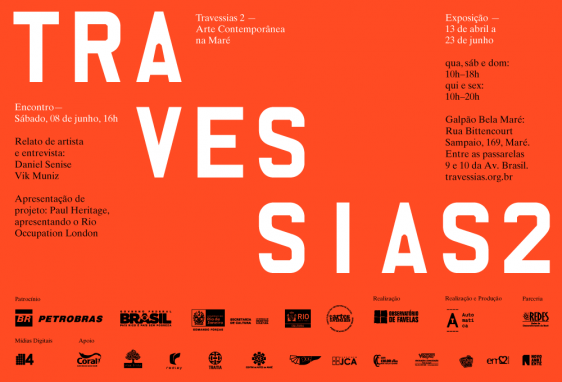VikMuniz
Travessias 2 – Bela Maré Galpão
[Travessias 2] Convite encontro, sabado, 08/06, 16h
From April 13th, the Bela Maré Galpão (barn) – located in the Maré Complex (RJ) – will be the stage of the exhibition Travessias 2 – Contemporary Art in Maré. In its second edition, the Travessias exhibition will present works by artists Arjan Martins, Cadu, Carlos Vergara, Daniel Senise, Ernesto Neto, Lucas Bambozzi, Luiza Baldan, Marcelo Silveira, Ratão Diniz and Vik Muniz, in addition to architecture and design workshops and enounters with personalities in different areas to discuss issues related to art, culture and social change in the city of Rio de Janeiro.
From April 13th, the Bela Maré Galpão (barn) – located in the Maré Complex (RJ) – will be the stage of the exhibition Travessias 2. In its second edition, the Travessias exhibition will present works by artists Arjan Martins, Cadu, Carlos Vergara, Daniel Senise, Ernesto Neto, Lucas Bambozzi, Luiza Baldan, Marcelo Silveira, Ratão Diniz and Vik Muniz, in addition to architecture and design workshops and enounters with personalities in different areas to discuss issues related to art, culture and social change in the city of Rio de Janeiro.
The exhibition aims to incorporate Maré slum and residents into the visual arts map, showing the role of Brazilian contemporary art and artist’s in an urban and aesthetic integration process. More than exhibiting in new spaces to new audiences, art becomes a powerful bridge between parties, expanding possibilities, stimulating talks and encounters among residents, critics, curators, gallerists, artists, students and other people interested in transforming the way we see the world and building more democratic territories.
Curated by Raul Mourão and Felipe Scovino, Travessias 2 brings together artists whose works have strong visual impact and, more than that, which have the revealing power to transform the way we see things. The exhibition gathers new research results on the expansion of painting (as in the works by Daniel Senise and Carlos Vergara) or how this means of expression connects with lyricism that reveals the precision of the artist’s gestures and their poetic outlook on randomly collected photographic scenes (as in Arjan Martins’ works). There is also the sculpture launched into space for a sense of experimentation (as in Cadu’s and Ernesto Neto’s pieces), photographic appropriation and deconstruction (Vik Muniz) and how its documental use is explored by the visual artists (in the works by Luiza Baldan and Ratão Diniz) or yet how it relates to sculpture (in the case of Marcelo Silveira), or still its poetic and political appropriation (in the videos by Luke Bambozzi). In the exhibition, these works are built around the idea of transformation, of a city in transition.
During the two months that the exhibition will remain set up at the Bela Maré barn, five meetings will be held, always on Saturdays, so that personalities engaged in the city’s transformation and also in the creation of new symbolic spaces can discuss and share their experiences and ideas. Artists, public administration officers, sportspeople, activists and free-thinkers will participate in these meetings, in a dynamics of presenting experiences and projects followed by interviews.
The project also includes architecture and design workshops. To expand the possibilities of reflection and experimentation, Maré residents will participate in the classes to assist in the dialogs in which the relationship between urban space and graphic art is explored. The Maré Complex itself will be the theme of architecture classes and its students will build a large scale model of the slum under the coordination of architect Pedro Évora, from Rua Arquitetos. In the design workshop posters will be collectively created that will later become exhibition catalog inserts.
The project also has an educational program meant for expanding the visitors’ experience with previous and subsequent work, in the school environment. A multidisciplinary education and art team will also make previously scheduled tours with for school groups and other institutions. The Travessias 2 exhibition will be the subject of a documentary to be made by 14 produções in collaboration with the Observatório de Favelas Audiovisual Center.
The Library Bela Maré will be inaugurated at the exhibition’s opening, with the donation of more than a thousand books by major publishers like Cosac & Naify, Martins Fontes, BEI, Cobogó, Azougue, Instituto Moreira Salles, Casa da Palavra, Barléu, among others.
photo caption or another comment.

